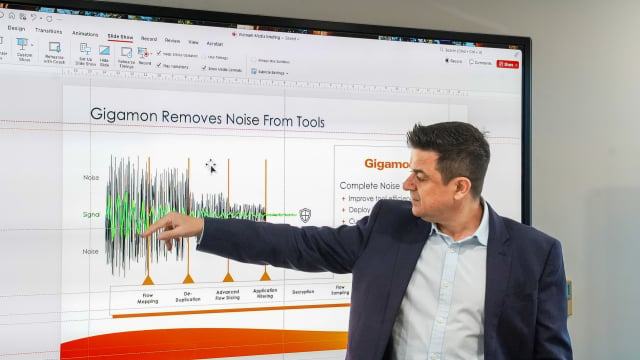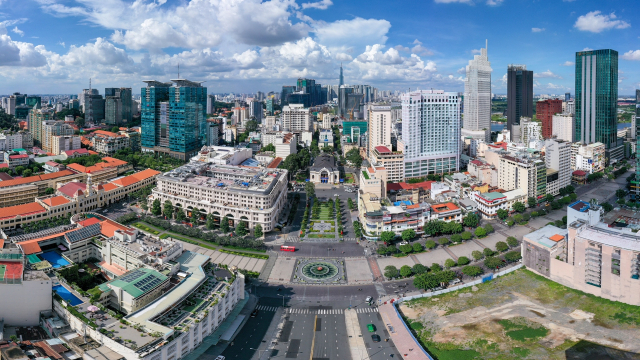Leader Talk
Resilient supply chains for Vietnam’s green transition
Overcoming supply chain woes could boost Vietnam's economy by $1.9 billion and strengthen businesses’ operations and their competitiveness on the global stage over the long term.

Ongoing geopolitical tensions and the Covid-19 pandemic have caused significant impacts on the Vietnamese economy, especially in the supply chain sector. According to a new analysis by business transformation consultancy TMX Global, this sets the national economy back by a staggering $1.9 billion annually.
TMX Global’s country manager for Vietnam Thomas Harris noted, as a manufacturing hub, the creeping high freight costs, tighter coal supplies, and inflation has been putting a strain on the finances of supply chain stakeholders.
“All in all, these disruptions have cost Vietnamese businesses, especially those in the textiles and electronics industries, a huge sum in terms of lost sales", said Harris.
While Vietnam has benefited from manufacturers and businesses rebasing their facilities outside of China over last year, Vietnam is also showing signs of an export slowdown. This comes in light of a global slowdown in demand, and it is thus more important than ever for Vietnam to strengthen its supply chain capabilities to be resilient against economic pressures.
Harris also noted that resilient supply chains are crucial for Vietnam’s green transition.
3 critical considerations for supply chain strategy

Since 2015, the Vietnamese government has been proactively working on the first national development strategy to harness renewable energy, with a goal of powering 32 per cent of the total primary supply and electricity generation through renewables by 2030. This has resulted in a massive growth of solar capacity between 2019 to 2020.
However, a lack of proper supply chain infrastructure is having a knock-on effect when it comes to the country’s energy security and its ability to deliver low-carbon products. This could adversely impact businesses’ operations and their competitiveness on the global stage over the long term.
Today, Vietnam urgently needs a secure supply of green energy for economic growth. Growing industrialization and economic modernization are projected to increase energy demand by over 8 per cent per annum during the 2021 - 2030 period. At the same time, Vietnam has also received international support to transition to cleaner sources of energy, as demonstrated by G7’s recent pledge of $15.5 billion.
Harris cited Covid-19 as a key example of how gaps within Vietnam’s supply chain infrastructure can be barriers to this transition. For instance, while the government has been investing in connectivity within and between Tier 1 and 2 cities to reduce potential bottlenecks, there remain limitations in transportation due to lockdowns and delayed policy responses, which have impacted the availability of wind power equipment during the pandemic.
Vietnam’s green energy transition is crucial not only because of global pressures, but to also bolster the country’s energy security. Over 70 per cent of the country’s industrial parks continue to be powered by the national power grid, sustained by coal, and the global energy crisis has shown that a reliance on coal can be detrimental to Vietnam’s economic growth – as illustrated by the persistent power outages and energy shortages that industries faced throughout 2022.
Consumers are also becoming more eco-conscious, which means that a business’s ability to stay competitive on the global stage will also hinge on the country’s green transition.
“However, since the pandemic, we’ve seen that the transition is a complex process for Vietnam – one that hinges greatly on global trade and supply chains. With that, bolstering the nation’s supply chain landscape will not only directly benefit its longstanding manufacturing pillars such as textiles and footwear, but also positively impact all businesses that are on this national trajectory,” said Harris.
In terms of the critical considerations for Vietnamese businesses for their supply chain strategy, he notes these three areas.
The first factor is the process, where operations are optimized and geared towards fast-changing customer preferences.
The second one is technology. Leveraging digitalization and emerging innovations are important to enabling these necessary business transformations.
The third consideration is people, where the logistics workforce now needs to upskill and transform to serve a reinvented supply chain.
“There is no better opportunity and time now to adapt and learn from the supply chain challenges of last year,” shared Harris.
Vietnamese tourism - from ‘disappointment’ to ‘a temple of delights’
Vietnam turns semiconductor vision into action
The global semiconductor industry is being reshaped by geopolitical tensions, shifting supply chains, and the surge of digital technologies.
Cutting red tape in APA approvals to speed up tax negotiations
The change in APA approval authority is expected to shorten processing time and enhance business proactiveness in international tax negotiations.
Enterprise cybersecurity is under threat from the inside
As hybrid cloud systems grow more complex, Vietnamese enterprises are struggling to detect cybersecurity threats moving laterally within their own networks.
Breakthrough for the international financial center ambition
The submission of the draft resolution on Vietnam’s international financial center to the National Assembly heralds a new developmental era for the country.
How leadership philosophy redefines hospitality in Nha Trang
More than just running a 5-star resort, Kristian Petersen is redefining the art of hospitality with a humane and sustainable leadership philosophy.
When organic becomes an inspiring wellbeing lifestyle
For Tyna Huynh, co-founder of Drinkizz, organic is not just a food choice but a way of life that fosters a deep connection between people, nature and community.










































